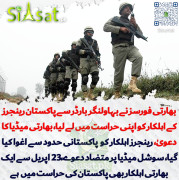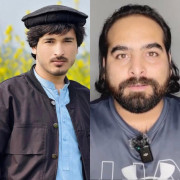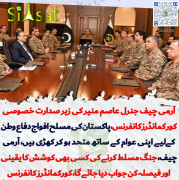Muhammad Tauseef A. Bajwa
Senator (1k+ posts)
Pakistan, USNew policy to be devised for drugs in Pakistan: DG Health at odds over Afghan solution
Pakistan, USNew policy at odds over Afghan solution
By Our Correspondent

US Marines from the First Battalion Eighth Marines Alpha Company patrol through the town of Kunjak in southern Afghanistan's Helmand province. - Photo by Reuters
NEW YORK: As the Afghan imbroglio heads towards another so-called endgame or impasse, US based think-tanks and experts here are saying that Pakistan and the United States are at odds over the final resolution of the crisis.
They even suggest Pakistan could seek to completely oust Washingtons influence in any resolution, which given the present situation could be a tough sell The Americans are seeking a strong and centralised Afghan government commanding a large army that can control its territory. Pakistan is pressing for a loosely governed neighbour where it can influence events through Taliban proxies, the New York Times reported citing top US and Pakistani officials.
The Pakistanis are nervous of the US aim for a strong Afghanistan and are pressing for a small Afghan Army and want to play a crucial role after the American exit from the country. The Times said Islamabad had sought to improve its leverage in Afghanistan by threatening to cut down CIA operations within its territory, cracking down on Taliban leaders to coerce their cooperation and befriend President Hamid Karzai.
The paper said the visit of Pakistani Prime Minister Yousuf Raza Gilani, countrys powerful army chief Ashfaq Parvez Kayani and head of the spy agency ISI, was the latest iteration of this new Pak-Afghan relationship.
This was the most public of a number of visits to Afghanistan by Kayani in the past year and American diplomats both in Kabul and Islamabad declined to comment on the visit and appear to know little about the intention of the two nations to unveil a joint commission with considerable fanfare as a vehicle to end the war, the NYT said.
Theres something special about a relationship that only gets worse, but never actually falls apart, the Foreign Policy magazine observed on Monday. It goes on to note: Pakistan has been selling itself to the United States as a national security bulwark since the earliest days of the Cold War, and Washington has been an eager and often uncritical buyer, subcontracting to Pakistani military and intelligence operatives much of the effort to arm and train the mujahideen who fought the Soviets in Afghanistan in the 1980s. Only in the 1990s, with the Soviet menace gone, did Washington allow the bonds to fray altogether, over Pakistans nuclear programme.
Americans have been coaxing the Afghan and Pakistan leadership to talk to each other, but not at the cost of keeping the US out of the loop or of concocting solutions that are against its interest, US officials said.
The latest visit by Pakistani leadership trio is an attempt to sidestep the US in order to safeguard Pakistans interest in
Afghanistan, the NYT said.
Pentagon officials said the differences evolved around which Taliban factions should be included in any settlement, the role of India an ally of the US but the enemy of Pakistan, and the size of the new Afghan army, which the Americans want big and Pakistani want small. The officials told the Times that while the overall commander in Afghanistan General David Petraeus was determined to batter the Taliban as much as possible, it was a policy the Pakistani disagreed with.
But the Chairman of Joint Chiefs of Staff Admiral Mike Mullen has more tolerance for the Pakistan point of view
The impression of the US leaving Pakistan out in the cold is particularly disconcerting to General Kayani because he was granted a three-year extension of his term last July, partly on the ground that he would win a seat for Pakistan at the Afghan negotiating table. The Pakistan and US differences in particular are more pronounced as Washington wants to keep up the pressure on the network led by Sirajjudin Haqqani, a long-time asset of Pakistan.
The recent demand by Pakistan for the US to reduce the number of CIA agents and curb its drones programme is the lowest point in memory that the relations between the two countries have plunged.
There was never a level of trust, said a former American military official who served in a senior position in Pakistan. Im convinced now they dont want our help.
Pakistan, USNew policy at odds over Afghan solution
By Our Correspondent

US Marines from the First Battalion Eighth Marines Alpha Company patrol through the town of Kunjak in southern Afghanistan's Helmand province. - Photo by Reuters
NEW YORK: As the Afghan imbroglio heads towards another so-called endgame or impasse, US based think-tanks and experts here are saying that Pakistan and the United States are at odds over the final resolution of the crisis.
They even suggest Pakistan could seek to completely oust Washingtons influence in any resolution, which given the present situation could be a tough sell The Americans are seeking a strong and centralised Afghan government commanding a large army that can control its territory. Pakistan is pressing for a loosely governed neighbour where it can influence events through Taliban proxies, the New York Times reported citing top US and Pakistani officials.
The Pakistanis are nervous of the US aim for a strong Afghanistan and are pressing for a small Afghan Army and want to play a crucial role after the American exit from the country. The Times said Islamabad had sought to improve its leverage in Afghanistan by threatening to cut down CIA operations within its territory, cracking down on Taliban leaders to coerce their cooperation and befriend President Hamid Karzai.
The paper said the visit of Pakistani Prime Minister Yousuf Raza Gilani, countrys powerful army chief Ashfaq Parvez Kayani and head of the spy agency ISI, was the latest iteration of this new Pak-Afghan relationship.
This was the most public of a number of visits to Afghanistan by Kayani in the past year and American diplomats both in Kabul and Islamabad declined to comment on the visit and appear to know little about the intention of the two nations to unveil a joint commission with considerable fanfare as a vehicle to end the war, the NYT said.
Theres something special about a relationship that only gets worse, but never actually falls apart, the Foreign Policy magazine observed on Monday. It goes on to note: Pakistan has been selling itself to the United States as a national security bulwark since the earliest days of the Cold War, and Washington has been an eager and often uncritical buyer, subcontracting to Pakistani military and intelligence operatives much of the effort to arm and train the mujahideen who fought the Soviets in Afghanistan in the 1980s. Only in the 1990s, with the Soviet menace gone, did Washington allow the bonds to fray altogether, over Pakistans nuclear programme.
Americans have been coaxing the Afghan and Pakistan leadership to talk to each other, but not at the cost of keeping the US out of the loop or of concocting solutions that are against its interest, US officials said.
The latest visit by Pakistani leadership trio is an attempt to sidestep the US in order to safeguard Pakistans interest in
Afghanistan, the NYT said.
Pentagon officials said the differences evolved around which Taliban factions should be included in any settlement, the role of India an ally of the US but the enemy of Pakistan, and the size of the new Afghan army, which the Americans want big and Pakistani want small. The officials told the Times that while the overall commander in Afghanistan General David Petraeus was determined to batter the Taliban as much as possible, it was a policy the Pakistani disagreed with.
But the Chairman of Joint Chiefs of Staff Admiral Mike Mullen has more tolerance for the Pakistan point of view
The impression of the US leaving Pakistan out in the cold is particularly disconcerting to General Kayani because he was granted a three-year extension of his term last July, partly on the ground that he would win a seat for Pakistan at the Afghan negotiating table. The Pakistan and US differences in particular are more pronounced as Washington wants to keep up the pressure on the network led by Sirajjudin Haqqani, a long-time asset of Pakistan.
The recent demand by Pakistan for the US to reduce the number of CIA agents and curb its drones programme is the lowest point in memory that the relations between the two countries have plunged.
There was never a level of trust, said a former American military official who served in a senior position in Pakistan. Im convinced now they dont want our help.































